March 2025
The global health intelligent virtual assistant market size surpassed USD 412.05 million in 2023 and is estimated to increase from USD 513.91 million in 2024 to approximately USD 4,680.01 million by 2034. It is projected to grow at a CAGR of 24.72% from 2024 to 2034.
The global health intelligent virtual assistant market size is projected to be worth around USD 4,680.01 million by 2034 from USD 513.91 million in 2024, at a CAGR of 24.72% from 2024 to 2034. The North America health intelligent virtual assistant market size reached USD 160.70 million in 2023. Organizations are also adopting technologies that help ensure a smooth patient experience. These advancements are crucial in enhancing the interaction between professionals and patients.
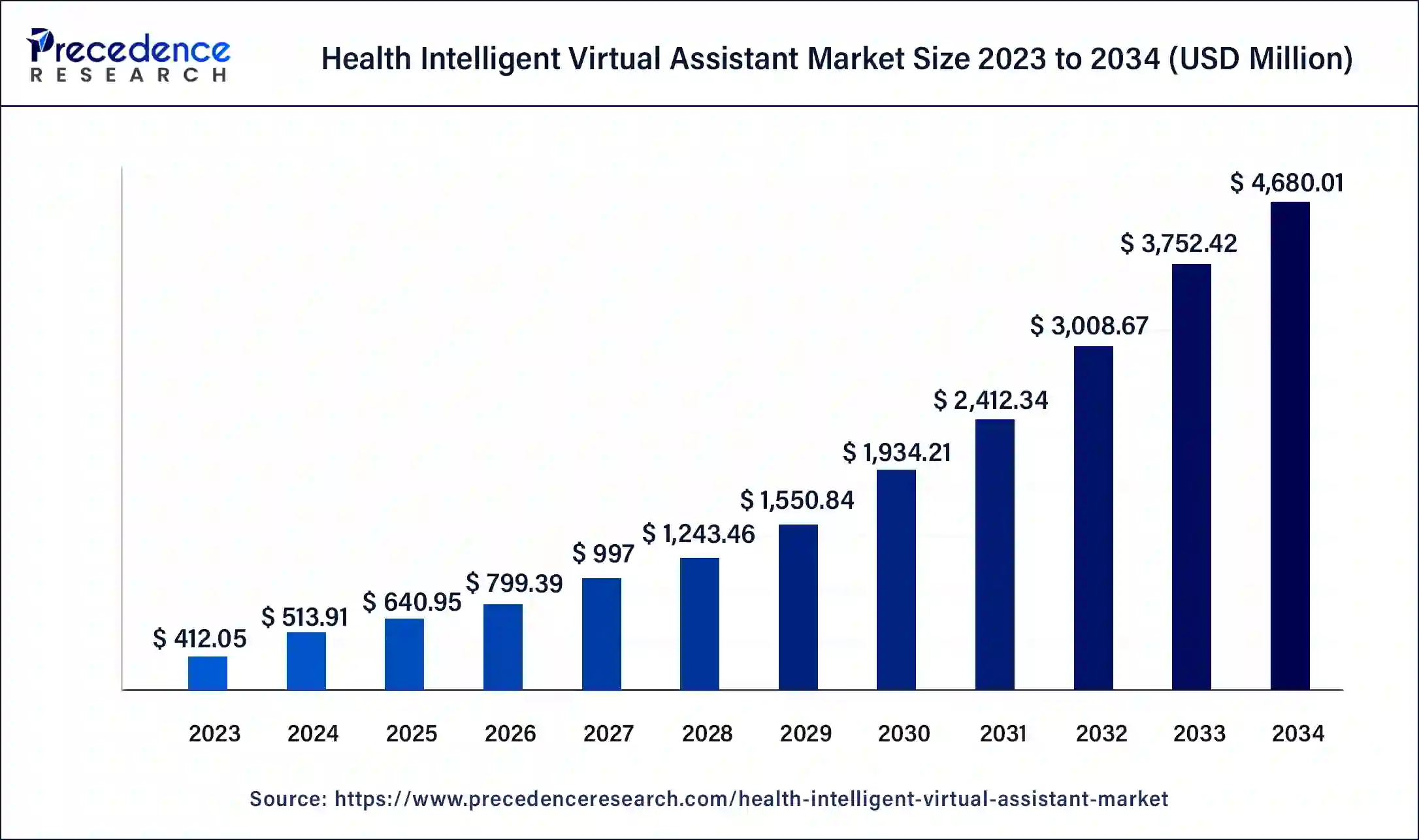
The U.S. health intelligent virtual assistant market size was exhibited at USD 120.52 million in 2023 and is projected to be worth around USD 1,395.70 million by 2034, poised to grow at a CAGR of 24.94% from 2024 to 2034.
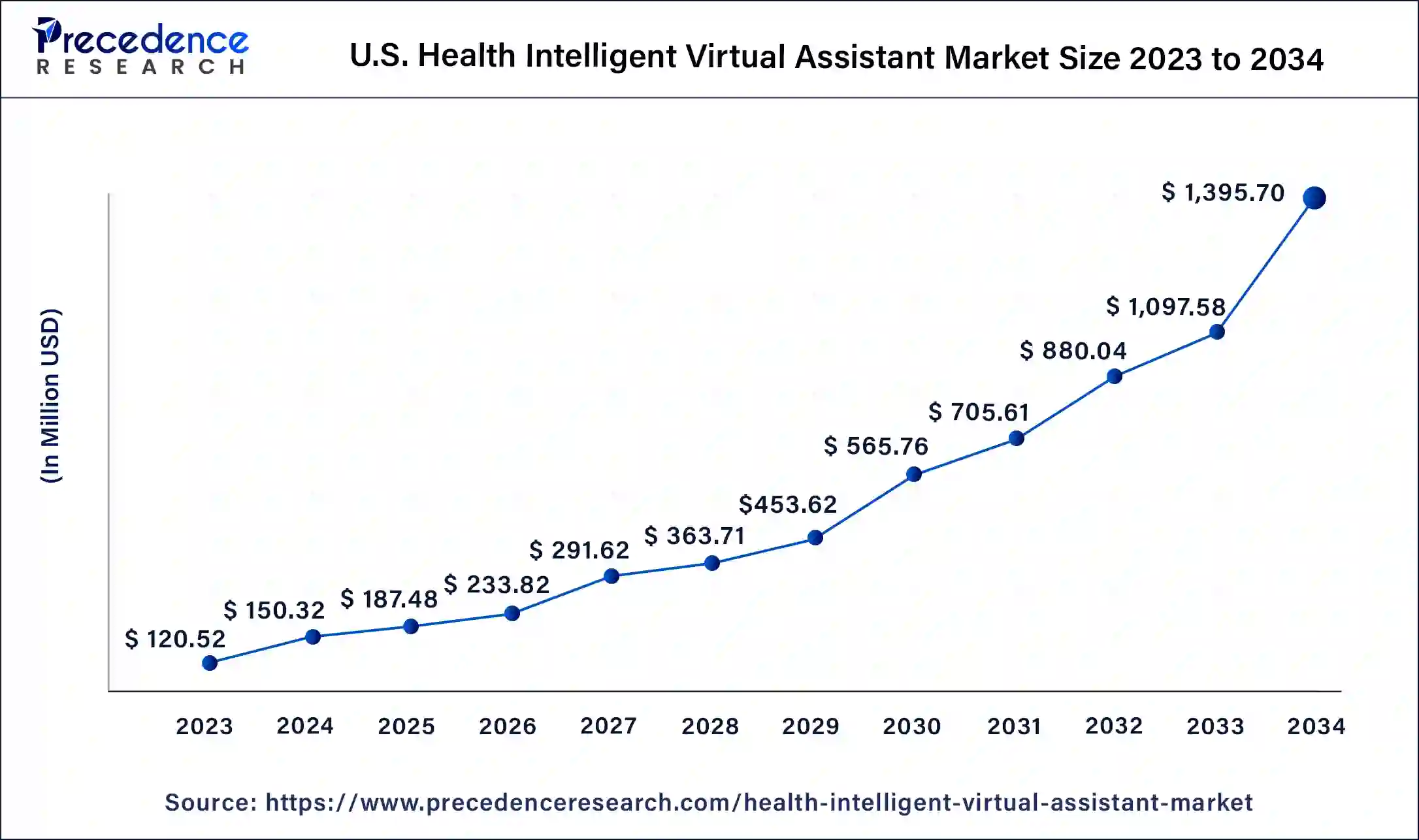
North America dominated the global health intelligent virtual assistant market in 2023. The growth of the region is attributed to the well-developed healthcare infrastructure in countries like the United States and Canada. This has raised the demand for HIVAs in healthcare settings and health insurance companies, which has created opportunities for providers. Additionally, the governments in the region invest heavily in innovations, which makes them dominant. As a result, it also benefits many IT companies that provide healthcare and digital health services.
Asia Pacific is expected to grow at the fastest CAGR in the health intelligent virtual assistant market during the forecast period of 2024 to 2034. The growing demand for HIVAs in the region is attributed to the increasing focus on healthcare in countries like Japan and India. The adoption of these technologies will help the Asian market to grow efficiently by enhancing patient engagement.
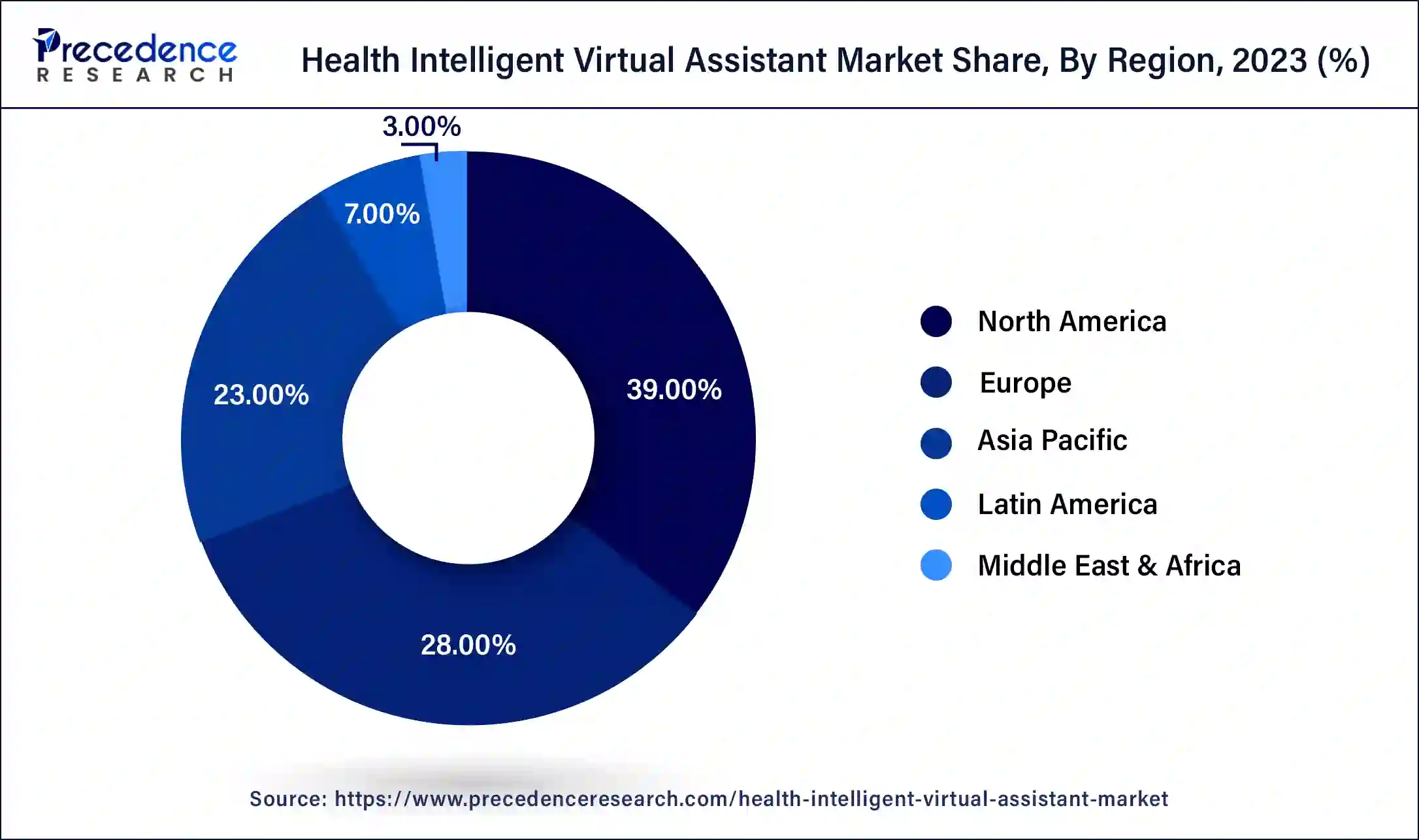
Asia Pacific is leading in terms of middle-class economies, which increases the demand for personalized services for chronic disease management in the health intelligent virtual assistant market. These economies are also adopting digital health solutions rapidly, which makes them the fastest-growing economies. Governments like China are taking initiatives to improve the overall health of their public.
Health intelligent virtual assistant (HIVA) refers to an artificial intelligence (AI) based digital service tool specially designed to assist healthcare professionals and enhance patients' experience in their healthcare-related tasks. The health intelligent virtual assistant market tool are designed by implementing technologies like machine learning (ML), natural language processing (NLP), and data analytics.
HIVA provides personalized services to patients with the help of text or voice, which answers their health-related queries about medical conditions, medications, and treatment plans. The assistant is also capable of scheduling appointments, which smoothens the patient experience by making the whole process easy and simple.
The health intelligent virtual assistant market is gaining significant demand due to the increasing demand for personalized services. The impact of Covid-19 has helped the market to gain more popularity due to the rules and restrictions during that period. It is considered a crucial period for the market as it has raised the demands for digital technologies and solutions in the healthcare sector.
How is AI Revolutionizing the Health Intelligent Virtual Assistant Market?
The emergence of AI and other technologies in the healthcare sector has been playing a vital role in the development of various solutions that are transforming the industry. The implementation of conversational AI in the health intelligent virtual assistant market can bridge the gap between professionals and patients. Technologies like NLP play a crucial role in understanding and responding to patient queries by using natural language, which provides a real human interaction experience for the patient.
AI is capable of analyzing datasets, which would help in providing health advice to the patient based on their medical history and preferences. The ongoing technological advancements in healthcare and the adoption of AI are fueling the market growth. Additionally, emerging technologies in wearable devices help AI track the daily activities of humans, which can help suggest alerts and recommendations. AI has been gaining significant popularity and contributing towards the growth of the health intelligent virtual assistant market as it is a time and cost saver for patients.
| Report Coverage | Details |
| Market Size by 2034 | USD 4680.01 Million |
| Market Size in 2023 | USD 412.05 Million |
| Market Size in 2024 | USD 513.91 Million |
| Market Growth Rate from 2024 to 2034 | CAGR of 24.72% |
| Largest Market | North America |
| Base Year | 2023 |
| Forecast Period | 2024 to 2034 |
| Segments Covered | Product, Technology, End-User, and Regions |
| Regions Covered | North America, Europe, Asia-Pacific, Latin America and Middle East & Africa |
Higher healthcare costs
The rising urbanization is a major factor behind the increasing healthcare costs in the major cities. The primary healthcare providers in low economies are bound to reduce operational costs due to low healthcare expenditures. The health intelligent virtual assistant market stands out as an affordable option for people who could get access to health information through the help of these tools, allowing individuals to manage their expenses. Adopting HIVAs can also be beneficial for healthcare providers as the adoption could eliminate frequent and unwanted visits by patients.
Increasing emphasis on chronic disease management
The rising prevalence of chronic diseases like diabetes and respiratory conditions needs constant care and attention, which could be unaffordable for the patients. This increases the demand for the health intelligent virtual assistant market as it could play a vital role in providing remote monitoring, like providing medication reminders to scheduling necessary appointments. As a result, many healthcare providers are adopting these services, which could help engage with customers with the help of AI.
Data privacy concerns
The emerging technologies in the health intelligent virtual assistant market have driven growth in the past few years. However, there are still some security concerns related to the data which could potentially hamper the market growth. These virtual health assistants have become commonplace for personal health information (PHI) which could lead to possible threats and frauds in case of any data loss. The emergence of technologies has also increased the number of cyber threats which demands the need for safe data and storing to gain patients' trust.
Rapid digitalization and technology adoption
The increasing use of smart devices and internet penetration in the developing region stands out as an opportunity for the health intelligent virtual assistant market. It increases the reach of virtual assistants, which is anticipated to bring many opportunities to healthcare IT professionals. The adoption of these technologies also helps patients manage their healthcare expenditures, which is expected to drive market growth during the forecast period.
Rising demand for remote healthcare solutions
The hectic work schedules, especially in the urban areas, stand out as a major reason behind the increasing demand for the health intelligent virtual assistant market. People could access these virtual assistants, which could help them in their day-to-day lives by providing 24/7 personalized healthcare services to them.
The chatbot segment marked its dominance by registering the largest share of the health intelligent virtual assistant market in 2023. Chatbots in the market are AI-based conversational agents who interact with users through texts. These chatbots are mainly found on websites and mobile applications. The reason behind the dominance of chatbots is that they offer multiple services to users, such as providing answers to health-related queries, booking appointments, providing alerts, reminders, and many more. The increasing use of smart devices like mobile phones, laptops, and tablets has helped them to establish their user base. Individuals prefer these health-based tools as they are cost-effective, and this also attracts multiple investments for more enhanced services in digital healthcare.
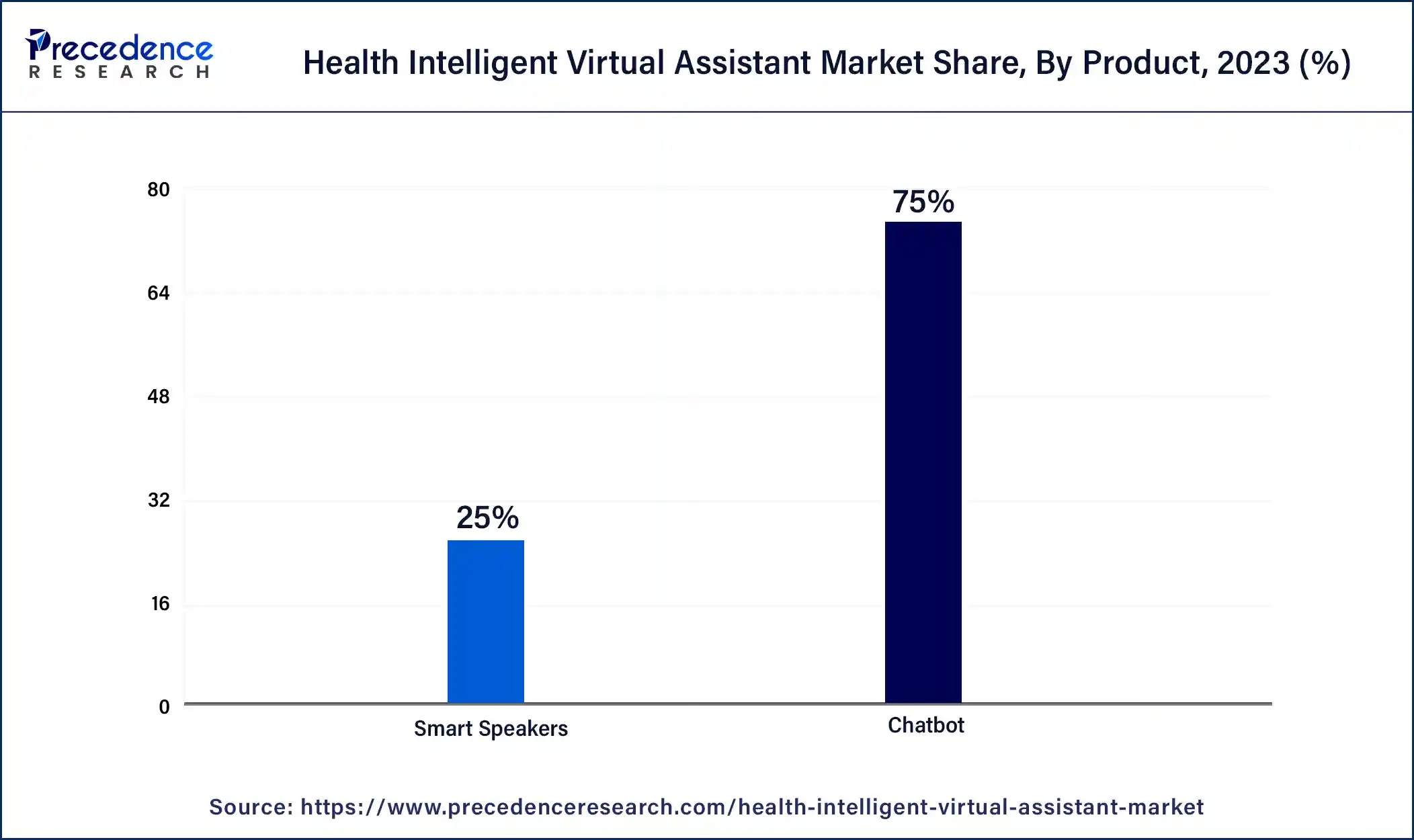
The smart speakers segment is expected to grow at the fastest rate in the health intelligent virtual assistant market from 2024 to 2034. These speakers are AI-based virtual assistants that provide health-related information, medication reminders, and alerts through voice integrations. The growing demand for smart speakers lies in the rising trend of voice technology. Many people prefer voice command tools in their daily lives, which can help them with any health-related query in a short time. This allows users to have a hands-free experience in their busy professional schedules. Additionally, the flexible services offered by the speakers are considered to be crucial for the geriatric population.
The text-to-speech segment held the largest share of the health intelligent virtual assistant market in 2023. Text-to-speech (TTS) is a technology that enables written text to be converted into speech. In the health intelligent virtual assistant market, TTS is used to speak health-related information aloud to the users so they can hear the responses and manage their overall health. The impact of various diseases has widely affected human health, which has led to the innovation of these ideas. These technologies are playing a crucial role for people who are visually challenged as they can access information through speech. This mainly includes elderly people who cannot read and hence prefer listening.
The automatic speech recognition segment is expected to register the fastest growth in the health intelligent virtual assistant market during the forecast period of 2024 to 2034. Automatic speech recognition in the market allows computers or assistants to understand the language spoken and convert it into text. It offers a hands-free experience to the users which makes it more preferrable to the users. It is considered to be crucial in voice-controlled interactions for enhancing the user experience. These technologies are driving market growth due to the increasing preference for verbal communication in the healthcare sector.
The providers segment accounted for the largest share of the health intelligent virtual assistant market in 2023. Providers in the market refer to healthcare professionals, clinics, hospitals, and other faculties that work on patient care. They use virtual assistants to enhance operational efficiency by scheduling appointments, following patient diagnoses, and following up with the patients. The adoption of these technologies plays a crucial role in enhancing patient engagement due to the smooth experience provided by the virtual assistant tools. Many healthcare providers are integrating health-intelligent virtual assistants with electronic health records, which is leading to market expansion.
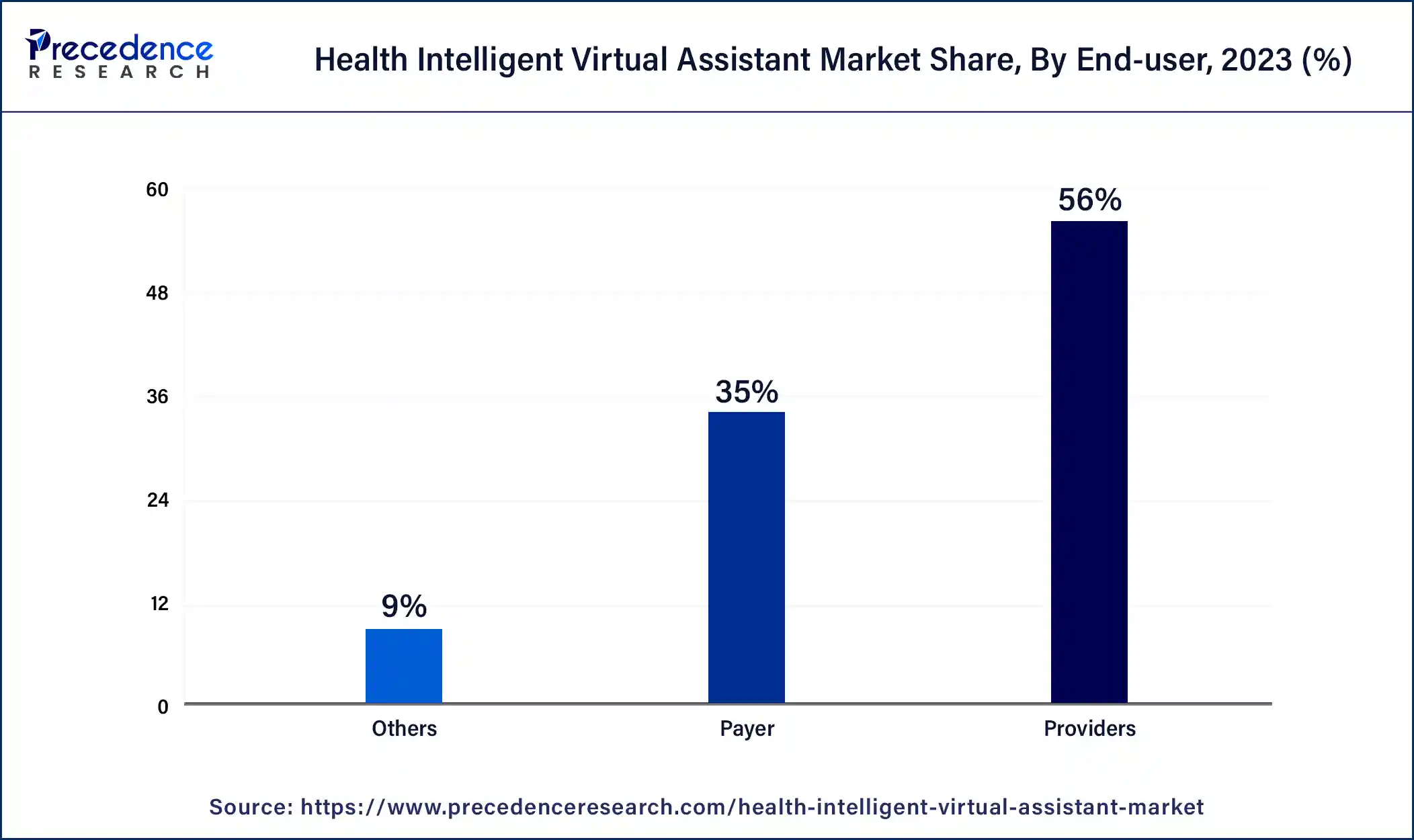
The payers segment is expected to grow significantly in the health intelligent virtual assistant market from 2024 to 2034. Payers in the market refer to the health insurance companies and other organizations that finance healthcare costs. The segment is growing efficiently due to the increasing demand for cost management in these companies, which would also help them detect fraud. Additionally, these companies are adopting HIVAs to enhance their customer service by enabling 24/7 customer support to their clients. These factors are considered to enhance patient reliability and contribute to market growth.
Segments Covered in the Report
By Product
By Technology
By End-User
By Geography
For inquiries regarding discounts, bulk purchases, or customization requests, please contact us at sales@precedenceresearch.com
No cookie-cutter, only authentic analysis – take the 1st step to become a Precedence Research client
March 2025
January 2025
January 2025
January 2025